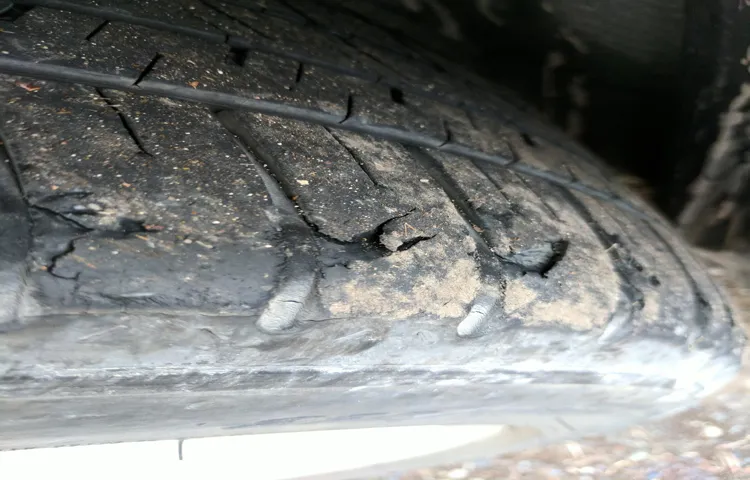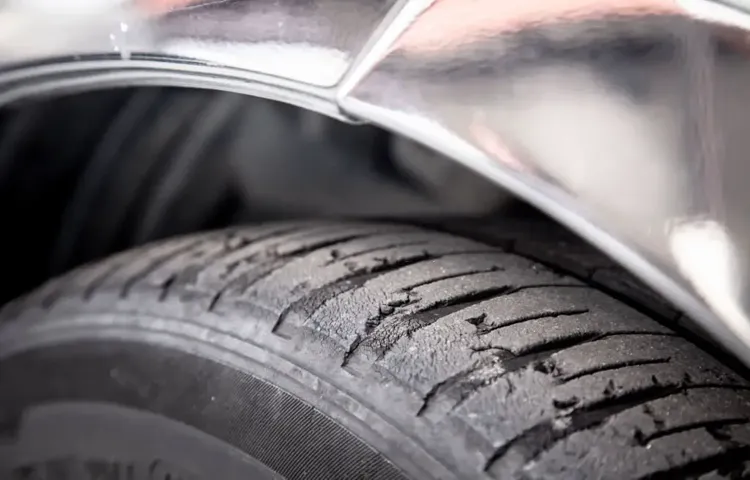When it comes to tire problems, tire chunking is one of the most common issues drivers face. Tire chunking is the term given to the breaking off of small pieces or chunks of rubber from the tire’s surface, which can ultimately lead to tire failure. If you’ve experienced tire chunking, you might be wondering about its causes.
In this blog post, we’ll explain the various factors that contribute to tire chunking, from wheel alignment issues to harsh road conditions to overloading. By understanding the causes of tire chunking, you can take steps to prevent it from happening and ensure your own safety on the road. So, let’s dive in!
Table of Contents
What is Tire Chunking?
Tire chunking is when pieces of rubber are torn off the tire, leaving behind small chunks that can cause damage if they come loose. It’s usually caused by a combination of factors, such as over-inflation, under-inflation, and excess weight. Overinflating the tire can cause it to become too rigid, and when combined with excess weight and poor road conditions, the tire is more susceptible to chunking.
Underinflating the tire can cause it to flex too much, leading to fatigue and ultimately chunking. Additionally, driving on rough or uneven roads, curbs, and potholes can also contribute to tire chunking. It’s important to regularly check tire pressure and avoid overloading your vehicle to prevent unnecessary damage to your tires.
Definition of Tire Chunking
Tire chunking refers to the wear and tear that occurs on the surface of a tire, causing small pieces of rubber to come off and form chunks. This can happen for a variety of reasons, including driving on rough terrain, driving at high speeds, or overinflating the tires. Chunking can also occur as a result of age and exposure to extreme temperatures.
Chunked tires can lead to decreased traction and stability, making it more difficult to control a vehicle. It’s important to regularly inspect your tires for signs of chunking and to replace them when necessary to ensure safe driving conditions.

Factors That Cause Tire Chunking
Tire chunking is a common problem that can affect your vehicle’s tires. It is caused by a variety of factors, including excessive tire wear, poor driving habits, and harsh road conditions. When tires are worn down, they are more susceptible to damage from potholes, rocks, and other debris on the road.
Poor driving habits, such as sudden braking or acceleration, can also put additional stress on the tires and cause them to wear down more quickly. Finally, harsh road conditions, such as gravel roads or uneven pavement, can cause the tires to chunk or break apart. To reduce the risk of tire chunking, it is important to practice good driving habits, maintain a proper tire pressure, and avoid driving on harsh road conditions whenever possible.
By taking these steps, you can help extend the life of your tires and keep your vehicle running smoothly.
Inadequate Tire Pressure
Inadequate tire pressure is one of the culprits behind tire chunking. When tire pressure is too low, the portions of the tire that make contact with the road can start to heat up and become excessively worn. This excessive heat leads to chunks of rubber being torn from the tire’s surface.
Moreover, under-inflated tires cause the sidewalls to flex more, increasing the likelihood of chunking. Therefore, always make sure that your tires are inflated to the recommended pressure by consulting your car’s owner’s manual or tire manufacturer’s specifications. This way, you can ensure that your tires stay healthy and don’t fall prey to chunking due to inadequate tire pressure.
Excessive Tire Load
Excessive tire load can be one of the significant factors that cause tire chunking. Overloading a vehicle puts extra pressure on the tires, causing them to wear out quicker than usual. When tires are overloaded, the weight causes them to flex and bend more often, leading to excessive heat accumulation in the tires.
The heat generated causes the tire components to break down, leading to tire chunking. Furthermore, the tire pressure gets affected which further exacerbates the situation. It is essential to ensure that your vehicle is never overloaded and that you always adhere to the manufacturer’s recommended tire pressure.
Furthermore, it is crucial to avoid excessive speed and sudden stops as they can also cause tire chunking. Regular inspections, maintenance, and replacements will help detect any tire-related issue early before it becomes severe. In summary, excessive tire load is one of the primary factors that cause tire chunking, so it is essential to avoid overloading your vehicle and to ensure proper tire maintenance to keep your tires in good shape.
Frequent Hard Braking
Frequent hard braking is a common cause of tire chunking, which is when pieces of the tire tread break off and expose the underlying layers. Chunking can occur due to a variety of factors, but hard braking is a particularly intense form of stress on the tires. To understand why hard braking causes chunking, it helps to think of the tire like a roll of tape: every time the brake is applied, the tire tread is pulled in one direction, just like when you pull on a strip of tape.
Over time, this repeated force can weaken the tread enough to cause chunks to break off, revealing the inner layers of the tire. If you’re experiencing chunking, consider adjusting your driving habits to reduce hard braking as much as possible. By doing so, you may be able to extend the life of your tires and avoid costly replacement.
Driving on Rough and Uneven Roads
Driving on rough and uneven roads can lead to a variety of tire problems, such as chunking. This issue occurs when large chunks of rubber break off from the tread, leaving uneven patches on the tire. There are several factors that can cause tire chunking, including overloading the vehicle, driving on underinflated tires, and regularly driving on rough terrain.
Overloading the vehicle places additional stress on the tires, causing them to wear down faster and potentially leading to chunking. Similarly, driving on underinflated tires puts more strain on the tread, making it more susceptible to damage. Lastly, regularly driving on rough terrain, such as potholed roads, can cause chunking over time as the tire absorbs repeated impacts.
To prevent tire chunking, it’s important to ensure that the vehicle is not overloaded, regularly check tire pressure, and avoid driving on rough terrain whenever possible. By taking these precautions, you can help your tires last longer and stay in better condition.
Aggressive Driving Style
Aggressive driving can cause a lot of damage to your tires. One of the most common problems is tire chunking, which can be caused by a number of factors. One of the main causes is braking too hard.
When you brake suddenly, the force can cause the rubber in your tires to start to peel away from the rest of the tire. This can cause small pieces of rubber to come off in chunks, which is known as tire chunking. Another factor that can cause tire chunking is hitting curbs or other obstructions.
If you drive your car aggressively and hit curbs or other obstacles frequently, your tires are more likely to develop this problem. In general, the more aggressive you are in your driving style, the more likely it is that you will experience tire chunking. To avoid this issue, it’s important to drive carefully and avoid aggressive driving behaviors as much as possible.
Effects of Tire Chunking
Tire chunking occurs when a tire’s tread begins to break apart in small chunks, leading to uneven wear and potentially dangerous driving conditions. The primary cause of tire chunking is typically overloading the vehicle or driving on rough terrain, which increases the stress on the tires and leads to damage. Additionally, poor tire maintenance, such as low tire pressure or failure to rotate the tires, can also contribute to chunking.
Once tire chunking occurs, it is crucial to replace the damaged tire as soon as possible to ensure safe driving conditions. It is also recommended to inspect your tires regularly for signs of wear or damage and to avoid overloading your vehicle or driving on rough terrain when possible to prevent tire chunking.
Decreased Tire Life Span
Tire chunking is a common problem that can significantly decrease the lifespan of your tires. When a tire chunks, it means that small pieces of rubber have come off the tire’s tread in a way that looks like it has been chewed up. This happens due to excessive heat build-up, rough terrain, or overloading of the vehicle.
The chunks on the tire surface can lead to increased vibrations that can seriously damage the suspension system, wheel bearings, and other parts of your vehicle. Moreover, it can also lead to uneven tread wear, which will eventually reduce your tire’s overall performance. To avoid these problems, drivers need to rotate their tires regularly and ensure that they are inflated to the correct pressure levels.
Protecting your tires from chunking not only extends their lifespan but also keeps you and your passengers safe on the road.
Poor Vehicle Handling and Stability
Tire chunking can have a significant impact on a vehicle’s handling and stability. This occurs when pieces or chunks of a tire become dislodged from the rest of the tire, resulting in an uneven wear pattern. As a result, the tire may not provide the same level of traction as before, affecting the vehicle’s stability and handling.
The driver may also experience vibrations or uneven steering, making it challenging to control the vehicle. To prevent tire chunking, it’s important to maintain proper tire pressure, avoid overloading the vehicle, and drive carefully on rough terrain. Regular tire inspections and replacements are also necessary to ensure safe driving conditions.
Remember, neglecting proper tire maintenance can lead to hazardous road situations, so it’s important to be proactive in taking care of your vehicle’s tires.
Ways to Prevent Tire Chunking
Tire chunking is a common problem that drivers encounter, and it can be quite dangerous if left unaddressed. Simply put, tire chunking is when pieces of the tire tread start to come off because of various factors such as excessive wear, high speeds, and rough terrains. One way to prevent tire chunking is to ensure that your tires are properly inflated at all times.
Underinflated tires put more pressure on the sidewalls, which can lead to chunking. Regular rotations and alignments can also help extend the life of your tires and prevent chunking. Another way to prevent tire chunking is to avoid driving at high speeds on rough terrains, as this can cause excessive friction and wear on the tires.
Lastly, investing in high-quality tires with a robust and durable design will ensure that they can handle heavy usage and reduce the risk of chunking. By taking these preventive measures, you can avoid the dangers and costs associated with tire chunking and ensure a safe driving experience.
Maintaining Adequate Tire Pressure
Maintaining Adequate Tire Pressure One of the best ways to prevent tire chunking is by maintaining adequate tire pressure. Underinflated or overinflated tires can be a big problem as they can cause uneven wear, which can lead to chunking. To ensure that your tires are properly inflated, it’s essential to check your tire pressure regularly.
You can use a tire pressure gauge to check the pressure levels and make sure that they’re within the recommended range. It’s also important to keep in mind that tire pressure can change depending on weather conditions, altitude, and load. So, make sure to always check your tire pressure before heading out on a road trip or long journey.
Maintaining proper tire pressure not only helps prevent tire chunking but also improves fuel efficiency and provides a smoother ride.
Avoiding Excessive Tire Load
Tire chunking is a common issue that can occur when tires are subjected to excessive load. This can happen when a vehicle is carrying too much weight or when the tires are not properly inflated. To avoid tire chunking, it’s important to be mindful of your vehicle’s weight capacity and never exceed it.
Additionally, regularly checking tire pressure and adjusting it as needed will help ensure that your tires are not being overloaded. Proper alignment and rotation can also help prevent tire chunking, as misalignment and uneven wear can put extra stress on the tire. Taking these preventative measures will not only help avoid costly damage to your tires but also keep you and others safe on the road.
Driving Responsibly and Smoothly
Preventing tire chunking is an essential aspect of driving responsibly and smoothly. Chunking is a situation where the tire lugs begin to break off, usually causing a rough ride, poor traction, and even complete tire failure. To avoid tire chunking, you need to first ensure that your vehicle has the right tires for your driving style and location.
Secondly, make sure your tires are correctly inflated to improve their longevity. Additionally, you should avoid overloading your car and minimize aggressive driving, as they contribute significantly to tire damage. Lastly, ensure that your tires are regularly rotated and balanced to even out wear and tear.
By following these tips, you can significantly reduce the likelihood of experiencing tire chunking, making your driving experience much smoother and stress-free.
Inspecting Tires Regulary
Regular inspection of your tires is crucial to prevent tire chunking. Tire chunking occurs when pieces of the tire surface break away, resulting in uneven wear and reduced traction. To avoid this issue, there are a few preventative measures you can take.
Firstly, ensure that your tires are properly inflated, as underinflated tires can cause excessive heat buildup and contribute to chunking. Secondly, avoid overloading your vehicle and distributing weight evenly. Uneven weight distribution can cause additional stress on your tires, leading to chunking.
Lastly, regularly inspect your tires for signs of wear or damage, such as cracks, punctures, or bulges. If you notice any of these issues, replace the affected tire immediately. By taking these preventative measures and regularly inspecting your tires, you can avoid tire chunking and ensure a safe driving experience.
Investing in Quality Tires
When it comes to investing in quality tires, preventive maintenance is key. One of the most common issues that tires face is chunking, which is when small pieces of rubber break off from the tire’s tread. This can be caused by a few different factors, including driving on rough roads, overloading the vehicle, or using tires that are not suited for the terrain.
To prevent chunking, it’s important to check your tire pressure regularly and make sure it is at the manufacturer’s recommended level. Additionally, avoid overloading your vehicle and try to avoid driving on rough, uneven terrain when possible. Investing in high-quality, durable tires is also a smart move, as they are less likely to experience chunking and other common tire issues.
Ultimately, taking proactive measures to care for your tires will help keep you safe on the road and extend the life of your investment.
Avoiding Rough and Uneven Roads
When it comes to preventing tire chunking, the key is to avoid rough and uneven roads. The road conditions you drive on can have a significant impact on your tires, causing them to wear down faster and in some cases, chunk. One way to avoid this is to choose well-maintained roads with minimal potholes and cracks.
Additionally, ensure that your tires are properly inflated and aligned to reduce the risk of uneven wear and tear. Regular maintenance and inspections can help catch any potential issues early on and prevent chunking before it occurs. Remember, taking care of your tires is not only essential for your safety but also for the longevity of your car.
Conclusion
In the world of tires, chunking is the jester of the court, the prankster of the game. It sneaks up on you when you least expect it, leaving you with a mess and a smirk. But behind the laughter lies the truth – chunking is caused by a variety of factors, from rough roads to incorrect tire pressure, and its impact can be minimized with proper maintenance and care.
So don’t let chunking be the punchline to your tire story – stay ahead of the game and keep those rubber round and rolling smoothly!”
FAQs
What is tire chunking?
Tire chunking is a phenomenon where large pieces of rubber come off from the tire’s tread, leaving behind a rough and uneven surface.
What are the common causes of tire chunking?
The common causes of tire chunking include overloading the vehicle, underinflated tires, misaligned wheels, aggressive driving, and poor quality tires.
How can overloading cause tire chunking?
Overloading a vehicle can cause excessive stress on the tires, resulting in the rubber wearing out quickly and chunking. It is important to adhere to the recommended weight limit for your vehicle.
Can underinflated tires cause tire chunking?
Yes, underinflated tires can cause tire chunking as they tend to run hotter than properly inflated tires, stressing the rubber and causing it to break apart.
How does misaligned wheels contribute to tire chunking?
Misaligned wheels can cause uneven wear on the tire, leading to chunking. It is important to have your vehicle’s wheels aligned regularly.
Can aggressive driving cause tire chunking?
Yes, aggressive driving, such as hard braking and acceleration, can cause excessive wear and tear on the tires, leading to chunking.
How can I prevent tire chunking?
To prevent tire chunking, it is important to maintain proper tire inflation, avoid overloading your vehicle, drive responsibly, and invest in good quality tires. Regular tire rotations and wheel alignments can also help prevent chunking.



